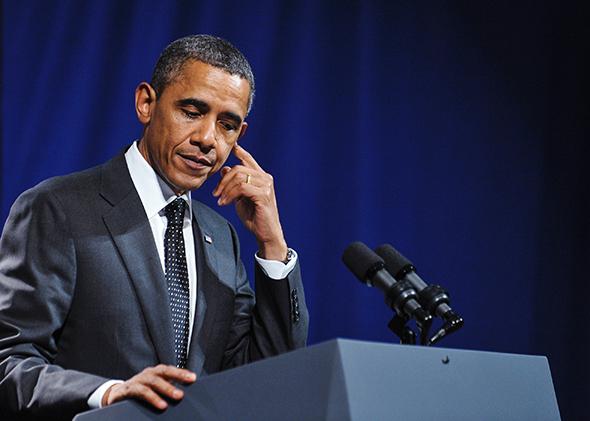The Supreme Court’s latest assault on campaign finance reform in this week’s McCutcheon decision paradoxically provides President Obama with a roadmap for serious reform. With Chief Justice John Roberts authorizing regulation to eliminate the appearance of corruption, the president should now call for a ban on contributions from high earners who reward senators and representatives for their votes in favor of tax loopholes for the super rich.
Although the president has speechified against the court’s decisions in the past, his actions tell a different story. In 2008, then-GOP presidential candidate John McCain relied on public financing, but Barack Obama chose to rely exclusively on private funding to outspend his rival by a 4-to-1 margin during the general election.* The president then followed up on his re-election victory by enthusiastically embracing super PACs in mobilizing Democrats for 2014
He also just signed a bill repealing public funding for political party conventions, requiring the presidential candidates to beg for money in order to kick off their campaigns. Is there any wonder that he is having trouble convincing Americans that the coming elections provide a serious opportunity to take back power from the 1 percent?
If the president is to be taken seriously, it’s time for him to make campaign finance a centerpiece of the upcoming campaign. Despite appearances, serious reform remains possible within the new limits set out by the Roberts court. Obama should take full advantage of the chief justice’s explicit recognition that the “appearance of corruption” serves as a compelling rationale for controlling contributions. This provides a meaningful roadmap for concrete reforms that will call a halt to the rise of plutocracy in American politics.
Consider, for example, the pathologies surrounding Wall Street’s defense of the loophole allowing big money to pay only 15 percent tax on investments as “carried interest.” To defend their right to pay lower rates than the average worker, hedge funds have doubled their political contributions from $20 million in 2008 to $40 million in 2012; yet more recently, private equity firms have entered the contribution business in a big way for the first time.
The impact of this rapid expansion in large gifts was recently on display when Republican Dave Camp, chairman of the House Ways and Means Committee, proposed a sweeping tax reform that would have eliminated this, and many other, loopholes that allow the top 1 percent to pay taxes at lower rates than those imposed on the average working family. Within days, threats of campaign retribution had generated widespread opposition in congressional ranks, leading a despairing Camp to announce that, despite his powerful position, he would not seek another term in office.
This stunning defeat of a reigning congressional baron, together with the escalating sums of big money, is more than enough to establish the “appearance of corruption.” Under present law, for example, federal contractors are not allowed to “make any contribution of money or other things of value” to “any political party, committee, or candidate.” After reviewing relevant case-law, a federal district judge upheld the ban because it “guards against ‘pay-to-play’ arrangements, in which people seeking federal contracts provide financial support to political candidates in return for their help securing government business.”
The same rationale should lead President Obama to propose a ban on contributions from taxpayers benefiting from the “carried interest” loophole. Going further, he should cap donations on any person who pays a lower tax rate than the rate of the average worker. Warren Buffet famously argued that it was wrong for millionaires to pay lower tax rates than their secretaries. But it’s even worse to let people who violate the Buffet rule make unlimited campaign contributions. When billionaire hedge-fund managers cash in on million-dollar loopholes after making large contributions, it smacks of just the kind of corruption that the Supreme Court says Congress can now target.
By taking this real-world approach, President Obama will also breathe new life into the flagging Democratic effort to gain control of Congress. While some super PAC funds may dry up, the president’s show of determination might convince ordinary Americans that it is actually worth coming out to the polls. Only one thing is clear: If Obama remains silent, the current plutocratic dynamic will further erode the foundations of our political life.
If the president does take a stand, it is even possible that a strong electoral showing will allow him to make some real progress in the next Congress. Moreover, a robust statutory response to the court’s ruling this week might lead at least one of the five conservative justices to take reality seriously, and rethink their current war on democratic self-rule. This is what happened in the Obamacare case, when Chief Justice Roberts made a last-minute “switch in time” to uphold the statute. It can happen again as he contemplates the public outcry provoked by a court that operates as the last bastion of big-money politics in Washington, D.C.
Correction, April 4, 2014: This piece originally misspelled Barack Obama’s first name. (Return.)
